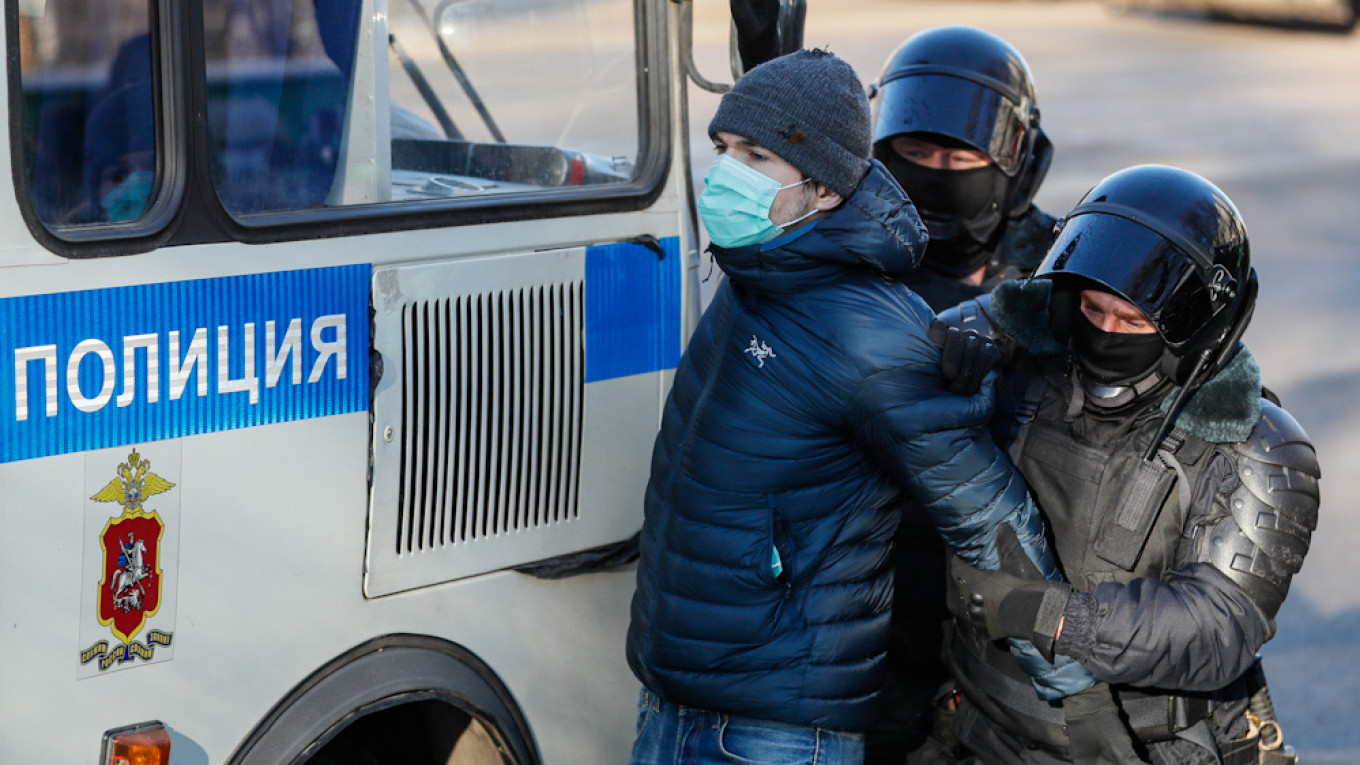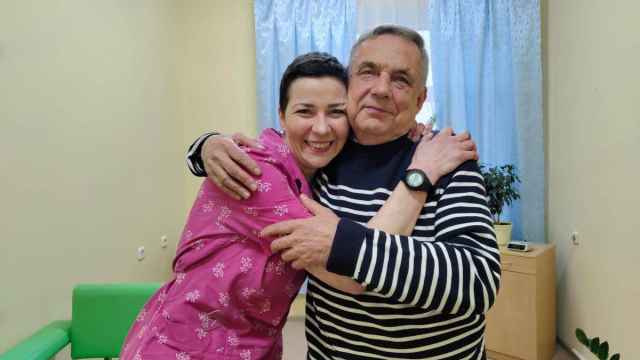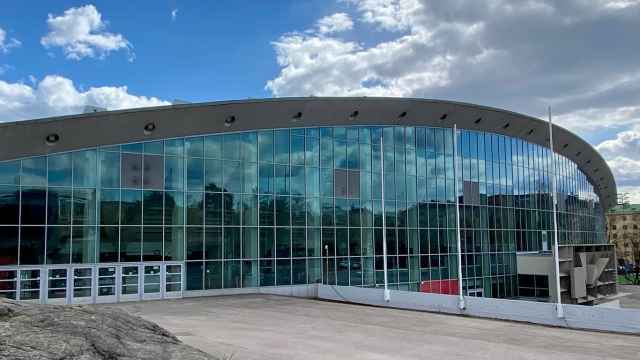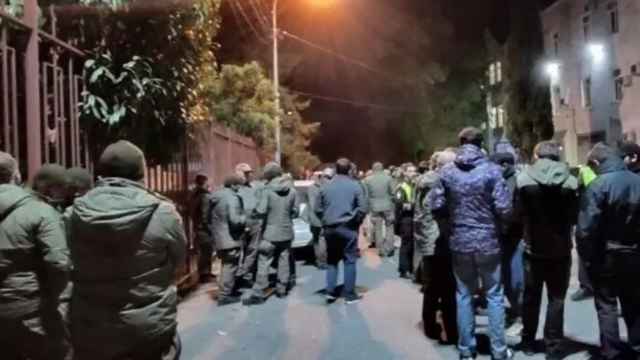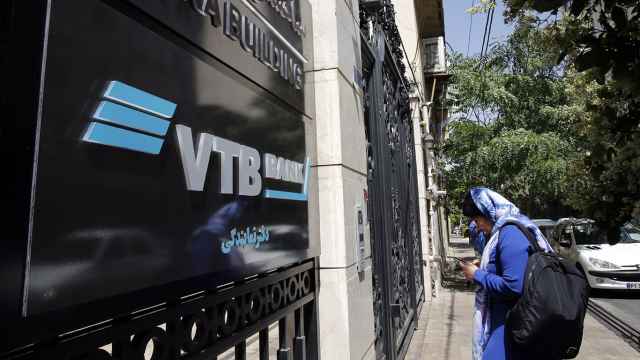On a frosty March morning, a group of anti-Putin opposition activists gathered in a Soviet-era hotel on Moscow’s outskirts to plan their strategy for September elections to the country’s national parliament. Ten minutes later, the police arrived.
Herded into police vans and shipped off to jail, around 200 attendees were charged en masse with participating in the activities of an undesirable organization, an offence that could see them banned from contesting elections.
“I don’t think they really knew what they were doing,” Yevgeny Roizman, a former Yekaterinburg mayor and ally of jailed opposition leader Alexei Navalny who was among those arrested, told The Moscow Times.
“I think they were just lashing out at whoever they could find”
For analysts, however, the arrests — which according to the RBC news site were supervised by the FSB — were the latest chapter in an ongoing campaign to exclude opposition candidates from September’s parliamentary vote as the ruling party defends its supermajority amid dismal polling and the threat of tactical voting by Navalny supporters.
In the aftermath of the January protests for Alexei Navalny’s release from prison, during which thousands of demonstrators were arrested, allies of the jailed opposition leader announced a strategic shift.
Instead of street protests, said Lithuania-based Navalny aide Leonid Volkov, the movement would refocus on its Smart Voting scheme ahead of the elections to Russia’s national parliament the State Duma, as support for the pro-Kremlin United Russia party sank to a historic low of 27% in the polls.
With explicitly pro-Navalny candidates almost never allowed to contest elections and many top aides likely to remain under house arrest on protest-related charges until the end of campaign season, Smart Voting entails the Navalny team endorsing the candidate they judge best placed to defeat United Russia in each individual race.
The strategy requires anti-government voters to rally round contenders from the so-called “systemic opposition,” the patchwork of largely tame and often co-opted opposition parties that are allowed to compete on Russia’s uneven electoral playing field.
However, six months from polling day, even the traditionally tolerated systemic opposition is coming under pressure, as the authorities clear the field for favoured candidates.
Already, a clutch of strong opposition candidates, ranging from communists to liberals and spanning regions from Moscow, to the Far East and the Arctic are facing legal proceedings that could see them barred from contesting the Duma elections.
For Tatiana Stanovaya, founder of the R.Politik political consultancy firm, filtering out opposition candidates ahead of time has upsides for a Kremlin keen to avoid a repeat of the mass protests that erupted when Navalny-aligned candidates were barred from contesting the 2019 Moscow City Duma elections.
“By gradually disqualifying candidates in advance, the Kremlin avoids having to formally bar them all at once, which could possibly provoke another wave of protests further down the line,” she said.
In the struggle to keep inconvenient candidates off the ballot, the single most important weapon in the authorities’ arsenal is the law itself.
Traditionally, opposition figures detained for political activism are convicted on public order charges, which Russian law treats as lesser, administrative offences, the penalties for which are limited to fines and short jail spells.
However, under Article 212.1 of the Russian Criminal Code, anyone convicted of violating public order three times in a six month period can be prosecuted as a criminal, and faces up to six years in prison. Crucially, those convicted lose the right to run in elections and can be stripped of any public offices they hold.
With Russia’s courts subject to strong political influence and public order prosecution guidelines vague, Article 212.1 — introduced in the aftermath of the 2011-12 wave of anti-Kremlin protests and known as the Dadinskaya Article for the first person prosecuted under it — has become the authorities’ go-to tool for neutralizing opponents ahead of elections.
In December 2020, Yuliya Galyamina, a prominent Moscow municipal deputy was given a two year suspended prison sentence under the Dadinskaya Article, having notched up multiple public order convictions protesting against last summer’s constitutional amendments that waived Vladimir Putin’s term limits until 2036.
Now a convicted criminal, Galyamina was forced to scrap her plans to contest an opposition-leaning Moscow State Duma district where she had taken second place in the previous election in 2016.
For observers, Galyamina’s case was a foretaste of the tactics the Kremlin will use to remove troublesome would-be candidates from September’s Duma race.
“We’re very likely to see a lot more candidates disqualified just as Galyamina was,” said Konstantin Kalachev, head of the Moscow-based Political Expert Group.
In Moscow — Russia’s most politically restive city — one district in particular is already becoming ground zero for prosecutions of opposition candidates.
By some measures, the State Duma’s 208th district is the most anti-Putin constituency in Russia. Taking in the prestigious neighbourhoods surrounding the Kremlin and dominated by the opposition at the municipal level, it is full of the affluent, liberal voters most sceptical of United Russia and open to Navalny-backed candidates.
Represented since 1995 by Nikolai Gonchar, a low-profile United Russia backbencher, the district is among the top electoral targets for the anti-Putin opposition, which has been largely excluded from the Duma for over a decade.
With observers sceptical that 74-year old Gonchar can mount a sufficiently dynamic campaign to hold his seat, a handful of prominent opposition figures have announced their own runs against the long-time incumbent.
Alongside Navalny aide Lyubov Sobol, two Moscow City Duma lawmakers — communist Yekaterina Yengalycheva and Sergei Mitrokhin from the liberal Yabloko party, both of whom won seats in 2019 with endorsements from Navalny’s Smart Voting scheme — have signalled plans to enter the race.
With Sobol under house arrest and unlikely to be permitted to run, Yengalycheva and Mitrokhin — who are both seen as sympathetic to Navalny — are facing escalating legal pressure as the leading non-United Russia contenders for the 208th district.
On March 13, both candidates were arrested within hours of each other for attending Moscow’s January protests in support of Navalny. Swiftly convicted of violating public order, they were given large fines.
For Mitrokhin, who was arrested again on similar charges days later and is now only one offence away from potentially losing his electoral rights under the Dadinskaya Article, the timing of the arrest hints at political motives.
“I can’t rule out that this was done specifically to stop me from running,” he told The Moscow Times.
“At this point, they could charge me again on any pretext they like.”
System malfunction
For some analysts, however, the crackdown is motivated less by worries about specific candidates and races than by a general concern that Russia’s finely poised system of choreographed elections and co-opted opposition parties may be malfunctioning.
In particular, an ever more radical, pro-Navalny mood among parts of the tame systemic opposition threatens to upset the carefully controlled political field ahead of the Duma elections.
“The Kremlin closely tracks any pro-Navalny activity among the systemic opposition parties,” said R.Politik’s Stanovaya.
“These cases are a warning for them to keep their distance from Navalny.”
In particular, the weeding out of Navalny-curious candidates serves to counteract Smart Voting, which relies on anti-United Russia voters coalescing around an agreed-upon candidate acceptable to anti-Kremlin forces.
Accordingly, to Kalachev of the Political Expert Group, the authorities may well combat Smart Voting by limiting Navalny supporters’ choices to an array of pro-Putin figures unattractive to the radical opposition.
In opposition-leaning Moscow, for example, the Communists — Russia’s largest parliamentary opposition party — is set to nominate almost exclusively “technical candidates” — nominal contenders whose thin resumes or hardline views give them little real chance of victory.
“It’s very likely that in the end only the most conservative, pro-Putin candidates will be allowed to run from the systemic opposition parties,” said Kalachev.
“And that suits the Kremlin very nicely.”
A Message from The Moscow Times:
Dear readers,
We are facing unprecedented challenges. Russia's Prosecutor General's Office has designated The Moscow Times as an "undesirable" organization, criminalizing our work and putting our staff at risk of prosecution. This follows our earlier unjust labeling as a "foreign agent."
These actions are direct attempts to silence independent journalism in Russia. The authorities claim our work "discredits the decisions of the Russian leadership." We see things differently: we strive to provide accurate, unbiased reporting on Russia.
We, the journalists of The Moscow Times, refuse to be silenced. But to continue our work, we need your help.
Your support, no matter how small, makes a world of difference. If you can, please support us monthly starting from just $2. It's quick to set up, and every contribution makes a significant impact.
By supporting The Moscow Times, you're defending open, independent journalism in the face of repression. Thank you for standing with us.
Remind me later.



